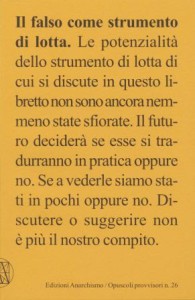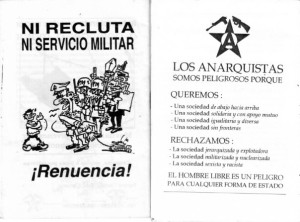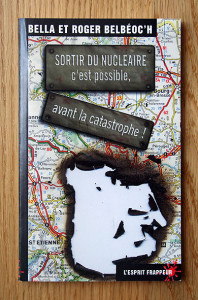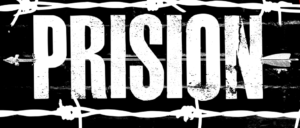The Dark Side of Chocolate, con subtitulos en español
Continue reading [Documental] ‘El lado oscuro del chocolate’
Tag Archives: 1990
A 25 años del rescate y liberación de Marco Ariel Antonioletti. “Antonioletti no se rinde”
“… y pase lo que pase,
Quedemos como quedemos,
Después de todas las mochas
Que demos al enemigo,
Volveremos a estar juntos y felices…”
COPEL, problema de Estado. Conclusión
Estamos tratando de una lucha anticarcelaria histórica e ideológica desde dentro de las cárceles, protagonizada por los presos franquistas. Probablemente sea la más difícil de las luchas sociales, muy suicida, porque el combate del preso contra el Estado lo fleta una clara desventaja, de todas las inferioridades posibles. El combatiente prisionero tuvo la iniciativa y la capacidad de sorprender, de jaquear, de promover publicitariamente sus carencias sociales como víctima por discriminación y abusos, pero esa desventaja fue también responsable de su derrota en cada lucha por el atrapamiento entre altos muros coronados por garitas de vigilancia con gente armada, más los ejércitos policiales o de cualquier tipo externos a los recintos penitenciarios. Cada derrota parcial por cada uno de los amotinamientos significaba la previsible derrota total del movimiento de lucha por las erosiones y pérdidas que peleas tan desesperadas ocasionaban en el ánimo y en la fuerza de los combatientes. Aún así, con perspectivas tan borrascosas, la COPEL protagonizó un gigantesco reto al Estado franquista en los años 1976, 1977 y 1978.
Continue reading COPEL, problema de Estado. Conclusión
Il falso come strumento di lotta
Nota introduttiva
Le potenzialità dello strumento di lotta di cui si discute in questo libretto non sono ancora nemmeno state sfiorate. Il futuro deciderà se esse si tradurranno in pratica oppure no. Se a vederle siamo, e siamo stati, in pochi oppure no. Discutere o suggerire non è più il nostro compito, sarebbe come mettere un cappello alla fantasia.
Buona fortuna.
Trieste, 2 dicembre 2011
Volante antimilitarista distribuido en la UCV
Durante la década de los 90´s, algunos jóvenes anarquistas en las ciudades de Barquisimeto y Caracas, empiezan a organizarse contra el servicio militar obligatorio y la institución militar en Venezuela. Este volante fue editado y distribuido de forma azarosa en la UCV por algunos jóvenes contestatarios.
Bella et Roger Belbéoch,
Bella et Roger Belbéoch, nés en 1928, sont physiciens, ingénieurs ESPCI.
Continue reading Bella et Roger Belbéoch,
A brief history of the armed struggle of GRAPO in Spain
GRAPO members arrested in 2007
The First of October Anti-fascist Resistance Groups (GRAPO) were formed in the summer of 1975. At that time twenty members of the Communist Party of Spain (reconstituted) -PCE(r)-, underground party formed five months before, carried out their first armed action against the fascist security forces. On 2nd August 1975 a couple of Civil Guard members (a repressive military police force) were shot in the centre of Madrid. One of them was dead and another one seriously injured. It was the first strike back of GRAPO against the wave of fascist-inspired terror known as the summer of terror.
Continue reading A brief history of the armed struggle of GRAPO in Spain
TURKEY: THE LAND OF MURDERED CHILDREN
 Children killed by Turkish police and soldiers in recent years
Children killed by Turkish police and soldiers in recent yearsContinue reading TURKEY: THE LAND OF MURDERED CHILDREN
Suhl: Das Ende eines selbstverwalteten Freiraums?!
1990: In Berlin, Hamburg, Leipzig und zahlreichen anderen Städten kommt es zu massenhaften Hausbesetzungen. Hintergrund dessen waren neben mangelnden Wohnraum auch, dass es prinzipiell jeder Stadt an selbstverwalteten Freiräumen fehlte, in denen man sich selbstbestimmter entfalten konnte und Schutz vor der erstarkten Neonaziszene hatte. Doch nicht nur in den Großstädten waren Hausbesetzungen ein Mittel um jene Räume zu schaffen, nach denen man sich sehnte.
Continue reading Suhl: Das Ende eines selbstverwalteten Freiraums?!
WHY PRISONERS FIGHT BACK
June 1990.
The Strangeways uprising, distinguishable for its intensity and duration, has generated a plethora of interpretations and analysed about what are perceived as the current ills of the British prison system and placed prisons as an issue close to the top of the political agenda. Unfortunately, none of the discussions about the cause and the rationale of the uprising, which acted as a catalyst for generalised unrest throughout the entire prison system, went much beyond the usual superficial and non-contentious issues of overcrowding, staff shortages and, of course, the existence of a ubiquitous minority of ‘subversive’ prisoners hel-lbent on disrupting prison life for purely gratuitous reasons.






 1
1


